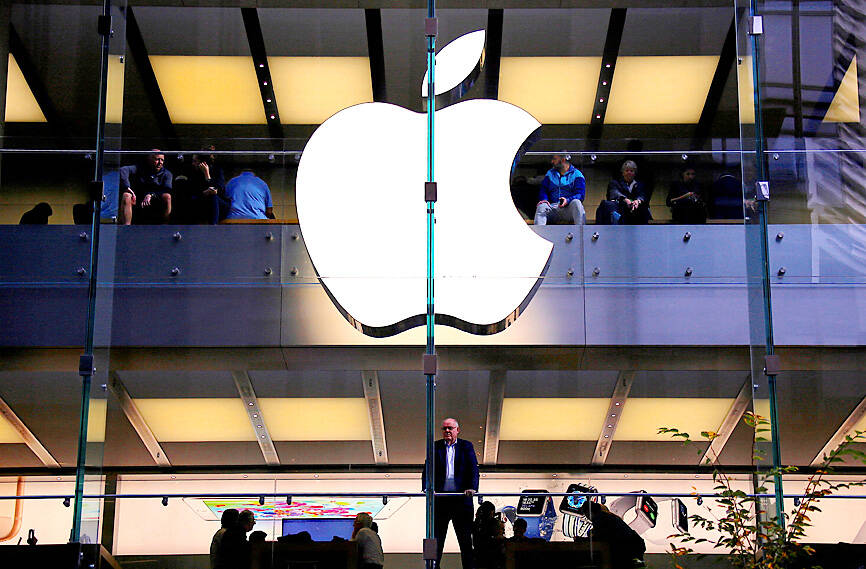Apple Inc is reshuffling management of its international businesses to put a bigger focus on India, people with knowledge of the matter said, in a sign of the nation’s growing importance.
The shift marks the first time that India becomes a separate sales region at Apple, which has seen demand surge in the country.
That gives the Asian nation increased prominence inside the tech giant, the people said on the condition of anonymity.

Photo: Reuters
Apple is making the change after the retirement of Hugues Asseman, its former vice president in charge of India, the Middle East, Mediterranean, East Europe and Africa. With his departure, the iPhone maker is promoting its head of India, Ashish Chowdhary, who reported to Asseman.
Chowdhary now reports directly to Apple head of product sales Michael Fenger.
The company posted record revenue in India last quarter, even as its total sales slipped 5 percent. Apple has created an online store to serve the region and is planning to open its first retail outlets in the country later this year.
On the last earnings call, Apple chief executive officer Tim Cook said that the company is putting “a lot of emphasis on the market,” and compared the current state of its work in India to its early years in China.
“We are, in essence, taking what we learned in China years ago and how we scale to China and bringing that to bear,” Cook said.
China generates about US$75 billion a year for Apple, making it the company’s largest sales region after the Americas and Europe.
In addition to serving as a sales engine for Apple, India is also becoming more critical to the company’s product development. Key suppliers are moving to the region and Apple is working with manufacturing partner Hon Hai Precision Industry Co (鴻海精密), also known as Foxconn Technology Group (富士康科技集團), to set up new iPhone production facilities in the country.
Asseman, a two-decade-plus veteran of the company, split his time between Apple’s office in London and its base in Cupertino, California. He began as a marketing manager handling the Mac and iPod lines. He later led retail teams before becoming Apple’s iPhone sales chief for Europe and other international markets in 2011.
Asseman started his latest role in 2015 and retired at the end of last year.
Separately, AirPods maker GoerTek Inc’s (歌爾聲學) Vietnam business chief is leaving the company, days after the executive outlined how Apple’s Chinese suppliers are likely to move capacity out of the country far faster than anticipated to pre-empt fallout from escalating Beijing-Washington tensions.
GoerTek deputy chairman Kazuyoshi Yoshinaga is departing for “personal reasons,” the Chinese firm said in a brief exchange filing.
Apple’s suppliers rarely comment on its thinking, in part because of the US company’s famous insistence on secrecy across its global supply chain.
Yoshinaga did not disclose Apple’s strategy or plans. Instead, he described how big US names are pressuring their Chinese suppliers to explore alternative production bases beyond the country, such as India and Vietnam.
GoerTek is investing an initial US$280 million in a new Vietnam plant while considering an India expansion, Yoshinaga said during last month’s interview.

BYPASSING CHINA TARIFFS: In the first five months of this year, Foxconn sent US$4.4bn of iPhones to the US from India, compared with US$3.7bn in the whole of last year Nearly all the iPhones exported by Foxconn Technology Group (富士康科技集團) from India went to the US between March and last month, customs data showed, far above last year’s average of 50 percent and a clear sign of Apple Inc’s efforts to bypass high US tariffs imposed on China. The numbers, being reported by Reuters for the first time, show that Apple has realigned its India exports to almost exclusively serve the US market, when previously the devices were more widely distributed to nations including the Netherlands and the Czech Republic. During March to last month, Foxconn, known as Hon Hai Precision Industry

Taiwan Semiconductor Manufacturing Co (TSMC, 台積電) and the University of Tokyo (UTokyo) yesterday announced the launch of the TSMC-UTokyo Lab to promote advanced semiconductor research, education and talent development. The lab is TSMC’s first laboratory collaboration with a university outside Taiwan, the company said in a statement. The lab would leverage “the extensive knowledge, experience, and creativity” of both institutions, the company said. It is located in the Asano Section of UTokyo’s Hongo, Tokyo, campus and would be managed by UTokyo faculty, guided by directors from UTokyo and TSMC, the company said. TSMC began working with UTokyo in 2019, resulting in 21 research projects,

Ashton Hall’s morning routine involves dunking his head in iced Saratoga Spring Water. For the company that sells the bottled water — Hall’s brand of choice for drinking, brushing his teeth and submerging himself — that is fantastic news. “We’re so thankful to this incredible fitness influencer called Ashton Hall,” Saratoga owner Primo Brands Corp’s CEO Robbert Rietbroek said on an earnings call after Hall’s morning routine video went viral. “He really helped put our brand on the map.” Primo Brands, which was not affiliated with Hall when he made his video, is among the increasing number of companies benefiting from influencer

Quanta Computer Inc (廣達) chairman Barry Lam (林百里) yesterday expressed a downbeat view about the prospects of humanoid robots, given high manufacturing costs and a lack of target customers. Despite rising demand and high expectations for humanoid robots, high research-and-development costs and uncertain profitability remain major concerns, Lam told reporters following the company’s annual shareholders’ meeting in Taoyuan. “Since it seems a bit unworthy to use such high-cost robots to do household chores, I believe robots designed for specific purposes would be more valuable and present a better business opportunity,” Lam said Instead of investing in humanoid robots, Quanta has opted to invest